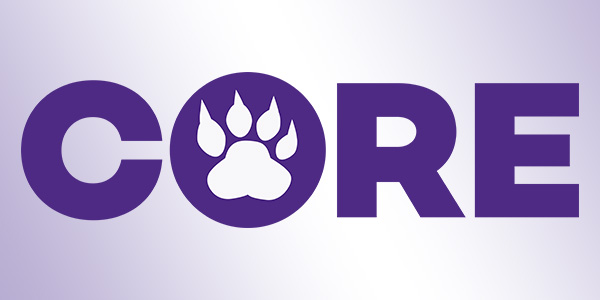Project Spotlight: CORE—Advancing Alumni Fundraising and Engagement Activities
 In March 2022, Administrative Systems (AS) initiated discovery for a multi-year program to transform the antiquated platform that supports Alumni Relations and Development (ARD) fundraising and engagement activities. The program, called CORE (CATracks, Our Northwestern, and Reporting Replacement Effort), is a considerable endeavor. It includes four projects working in tandem to streamline ARD business processes, increase data collection and repository capabilities, provide alumni and donor-centric experiences, and ensure security protocols are met—requiring over 50,000 work hours from AS alone. It is expected to be completed in May 2025.
In March 2022, Administrative Systems (AS) initiated discovery for a multi-year program to transform the antiquated platform that supports Alumni Relations and Development (ARD) fundraising and engagement activities. The program, called CORE (CATracks, Our Northwestern, and Reporting Replacement Effort), is a considerable endeavor. It includes four projects working in tandem to streamline ARD business processes, increase data collection and repository capabilities, provide alumni and donor-centric experiences, and ensure security protocols are met—requiring over 50,000 work hours from AS alone. It is expected to be completed in May 2025.
With the discovery phase ended and the program now progressing, we sat down with Alan Garbarino, director of Data Management and Analytics, and Andrew Ludington, director of Enterprise Systems Alumni and Financials, to learn more about the importance of this cross-campus effort, its impact on the University's business, and the expertise each AS team provides.
Why is the CORE program important to the University?
Andrew: The new platform will allow us to take advantage of the latest customer relationship management (CRM) software, tools, and functionality to streamline fundraising and engagement activities with ARD and, by association, the alumni areas with the University's professional schools: Pritzker School of Law, Feinberg School of Medicine, Kellogg School of Management, and McCormick School of Engineering. University security guidelines and protocols have also evolved, and we are working with the Information Security Office to ensure these will be met.
Alan: In addition to the technological advancements, we will rebuild and modernize the data warehouse, providing updated Cognos reporting and self-service functionality. We will also implement a CRM analytics tool that will allow more intuitive insights into the data and allow those insights to be gathered and reported by teams within ARD and around the University instead of being solely IT-driven.
Andrew: Although the main CRM launch will not be until May 2025, we have segmented the program into constituent parts and determined deliverables that can be released along the way to build momentum and excitement.
The first of these deliverables, GiveCampus, was launched this quarter. GiveCampus is an online giving platform that offers a variety of donation subscription and payment options, including Zelle and Venmo. Sites can also be created for purpose-driven fundraising activities.
Another component we released this quarter is the MuleSoft Anypoint integration platform. Anypoint will function as a more robust integration broker and development environment than we use today. We will use it to build out the 31 integrations for CORE, after which it will become the standard integration platform for Administrative Systems.
Alan: A big part of the success of this project is process evaluation and improvements on our business partner side and enabling those changes.
What are some ways the new platform will benefit University business?
Andrew: The new platform will enable better data-driven decisions and offer an opportunity to automate many manual tasks. For example, ARD's major gift officers travel nationally and internationally to connect with alumni and donors. As you can imagine, a lot of research and planning goes into preparing for each visit, identifying the prospective donors in the area, identifying their philanthropic interests, setting up meetings, preparing follow-up communication, etc.
The new environment will allow ARD to automate much of this time-consuming work. They can build embedded reports to map prospective donors, with filters to allow officers to utilize valuable data within the CRM (like past giving, interests, and employment) and associated tools (like what links they are clicking in their emails and what events are they attending) that will help them pinpoint the key alums and donors to visit; a workflow process to ensure planned calls, visits, and solicitations are sequenced for more effective use of their valuable time; and integration with Outlook to allow officers to record their emails and calls in the CRM more easily.
Alan: The new platform is an ecosystem of multiple applications that interact with one another for a purpose-driven availability of data or functionality. There are opportunities to automate manual processes based on that functionality and a new CRM analytics tool that will allow quicker and more self-sufficient access to information for ARD analytics teams.
Easier access to data will allow teams to respond to ad hoc questions and expand upon current ARD data-driven decision-making more quickly. Currently, someone with a new question that cannot be anticipated must rely on limited IT resources for analysis and reporting. Depending on the complexity and priority of the data requested, this can introduce wait times that reduce efficiency.
A Shout-Out to All the Teams Involved
Each team within AS has an important part to play and expertise to contribute to the success of CORE in partnership with ARD. A special shout-out to Cyberinfrastructure for supporting the existing platform during this transition and to the Information Security Office for their work to keep data security top of mind.